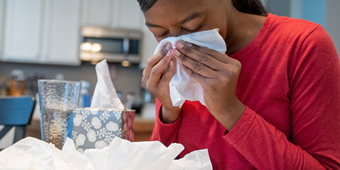Make It Stop! A Quick Guide to Allergy Relief

Answer a few questions and we'll provide you with a list of primary care providers that best fit your needs.
You can’t prevent allergies, but you can avoid exposure to the allergens that set off your allergy symptoms. And you can relieve allergy symptoms through a combination of self-management and doctor-supervised treatments.
Avoiding your allergy triggers — pet dander, peanuts, pollen, or whatever else — is the starting point of an effective anti-allergy defense. This, of course, requires knowing what you’re allergic to. (So, the true starting point is seeing your doctor and being tested for allergies.)
Self-Management of Allergies
You can buy many allergy medications over-the-counter (OTC) without a prescription to manage symptoms. These include:
- Antihistamines, which help stop symptoms such as sneezing, runny nose and itchy, watery eyes. They stop the symptom-causing histamines, the chemicals your body sends out in reaction to allergens. Antihistamines are available as pills, liquids and nasal sprays.
- Decongestants, which open your airways, relieve sinus pressure and reduce swelling in your nose. They are available as pills, liquids and nasal sprays. They should not be used for more than a few days, as overuse can worsen symptoms.
- Saline sprays, rinses and gels, which help soothe and moisturize your nose and remove mucus and crust.
- Steroid nasal sprays, which help lessen nasal congestion and swelling, runny noses and sneezing. These should be used only with your doctor’s recommendation.
Medications that combine an antihistamine and decongestant also are available.
All OTC medications should be taken as directed. Consult your doctor’s office or pharmacist when you have questions.
Physician-Supervised Allergy Treatment
Knowing what triggers your allergies is important so you can avoid them.
When OTC remedies don’t work, your physician may:
- Write you a prescription for a stronger or different type of drug. If you suffer from swelling and inflammation from allergies, including allergic asthma, your doctor may prescribe corticosteroids. These are available as nasal sprays or oral medications and must be taken under doctor supervision. Long-term use raises the risk of side effects.
- Refer you to an allergist or ear, nose and throat specialist who can test you to determine if allergy shots — or immunotherapy — could help you. Immunotherapy shots introduce small amounts of an allergen over several months to help your body adjust and reduce your symptoms. In reaction to the shots, your body produces infection-fighting antibodies. Immunotherapy has been shown to reduce allergy symptoms in 80 to 90 percent of patients. In many cases, the therapy completely relieves symptoms.
Emergency Treatment of Severe Allergic Reactions
Most people with allergies experience mild to moderate symptoms — a runny nose, sneezing, watery eyes or rash.
However, anaphylaxis is a severe, life-threatening allergic reaction that requires emergency treatment. (And beware: People with mild symptoms can develop more severe reactions in their lifetime.)
Most commonly associated with allergies to food, insect stings, medications and latex, anaphylaxis involves an over-release of chemicals that puts the body in shock.
Symptoms occur suddenly and progress quickly — from mild symptoms such as a runny nose and skin rash, to a strange feeling, to serious health problems such as difficulty breathing, throat swelling, vomiting, dizziness and fainting, low blood pressure and even cardiac arrest.
In the event of a severe allergic reaction:
- Call 911 immediately.
- Check the victim’s airway, breathing and circulation.
- Keep the person calm.
- Elevate the person’s feet about 12 inches, cover with a blanket and place nothing under his head.
- If necessary, perform rescue breathing and CPR.
Emergency personnel will administer epinephrine immediately to stop the anaphylactic reaction.
If you have had an anaphylactic reaction in the past, you are at risk of future reactions. Your doctor can prescribe emergency epinephrine (EpiPen®) to carry with you for emergencies.
Avoid Exposure to Allergens
Whether you have severe or milder allergic reactions, knowing what triggers your allergies is important so you can avoid them. Avoidance is the most effective way to prevent any allergic reaction, including anaphylaxis. Develop an avoidance plan with your doctor that’s customized to your age, lifestyle and home environment.
Carefully read food labels and labels of other products that could contain allergens. And be aware that fragrances and dyes can irritate your skin.
Answer a few questions and we'll provide you with a list of primary care providers that best fit your needs.
Source: Premier Health; Healthline.com; College of Allergy, Asthma & Immunology




